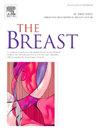Baseline tumour burden and prognosis in breast cancer treated with immune checkpoint inhibitors
IF 7.9
2区 医学
Q1 OBSTETRICS & GYNECOLOGY
引用次数: 0
Abstract
Background
Immune checkpoint inhibitors (ICI), alone or in combination with other agents, are now standard of care for a range of tumour types, including breast cancer. Radiological assessment of baseline tumour burden has been associated with prognosis in a variety of tumour types treated with immunotherapeutic agents. Whether baseline tumour burden is prognostic in breast cancer treated with ICI is unknown.
Methods
A retrospective review of patients from a single institution with advanced breast cancer treated with ICI was performed. The sum of baseline target lesion measurements (baseline tumour size [BTS]) and all lesions (total tumour burden [TTB]) were determined in accordance with RECIST version 1.1 and correlated with clinical outcomes.
Results
82 patients were identified, treated between 2015 and 2020. BTS and TTB by quartile were significantly associated with overall survival (OS) (p < 0.001) and clinical benefit rate at 6 months (CBR6) in univariable analysis (p = 0.004 and p = 0.002 for BTS and TTB, respectively). Multivariable analysis confirmed a significant inverse relationship with OS for both BTS (p = 0.035) and TTB (p = 0.024). A non-statistically significant numerical inverse association between increasing tumour burden and progression free survival was also observed.
Conclusion
Baseline tumour burden assessed by BTS and TTB is significantly associated with prognosis in advanced breast cancer treated with ICI and should be considered a potential biomarker to improve selection of patients for treatment with ICI. These results suggest that ICI treatment will be most effective in patients with lower tumour burden.
免疫检查点抑制剂治疗乳腺癌的基线肿瘤负荷和预后
背景:免疫检查点抑制剂(ICI),单独或与其他药物联合,现在是一系列肿瘤类型的标准治疗,包括乳腺癌。基线肿瘤负荷的放射学评估与免疫治疗剂治疗的各种肿瘤类型的预后有关。基线肿瘤负荷是否影响ICI治疗的乳腺癌预后尚不清楚。方法:回顾性回顾来自单一机构的晚期乳腺癌患者进行了ICI治疗。基线靶病变测量值(基线肿瘤大小[BTS])和所有病变(总肿瘤负荷[TTB])的总和根据RECIST 1.1版确定,并与临床结果相关。结果:2015年至2020年共发现治疗82例患者。结论:BTS和TTB评估的基线肿瘤负担与ICI治疗的晚期乳腺癌预后显著相关,应被视为改善ICI治疗患者选择的潜在生物标志物。这些结果表明,ICI治疗对肿瘤负荷较低的患者最有效。
本文章由计算机程序翻译,如有差异,请以英文原文为准。
求助全文
约1分钟内获得全文
求助全文
来源期刊

Breast
医学-妇产科学
CiteScore
8.70
自引率
2.60%
发文量
165
审稿时长
59 days
期刊介绍:
The Breast is an international, multidisciplinary journal for researchers and clinicians, which focuses on translational and clinical research for the advancement of breast cancer prevention, diagnosis and treatment of all stages.
 求助内容:
求助内容: 应助结果提醒方式:
应助结果提醒方式:


